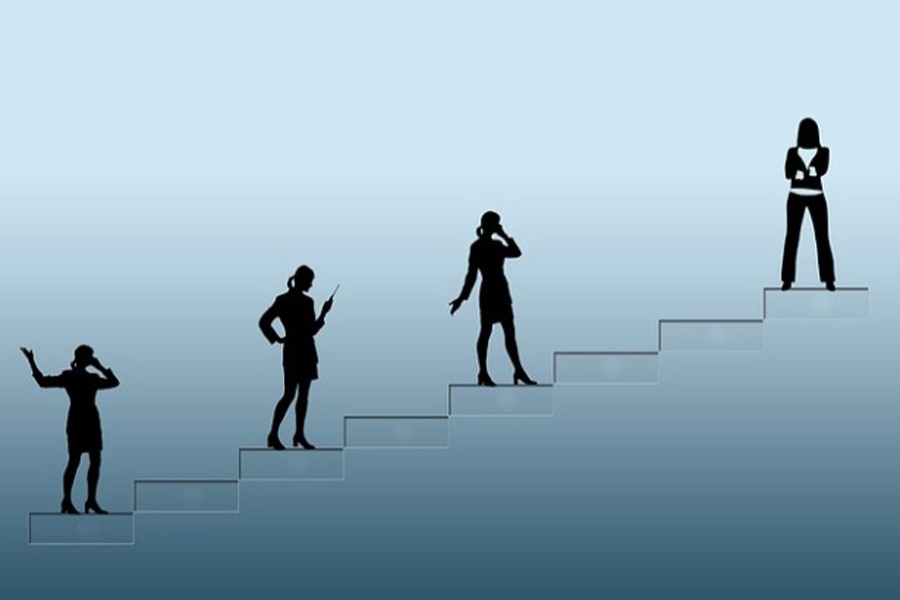The International Women's Day, observed worldwide on March 08 since 1911, reflects unity, action, awareness from global to the local level. International Women's Day 2020 has special significance for gender equality since this year is the 25th anniversary of the Beijing Declaration and Platform for Action. Beijing Declaration had set out strategic objectives to achieve gender equality in 12 areas. Now, it needs to be reviewed how far achievement is made, and where Bangladesh stands for women's rights.
'Each for Equal' is the theme for this year's Women's Day which is focusing on cultural, political and socio-economical achievements of women across the globe. An equal world represents equal rights and opportunities for both women and men across employment, education, culture, economy and political power.
However, where does Bangladesh stand in this fight for an equal society? Are we on track? Does Bangladesh has an image that women are safe and protected and enjoy equal share in socio-economical and political power? Current employment statistic, political power of women and gender-based sexual harassment and violation offer a varying pictures in terms of vulnerability and position of women in Bangladesh.
Over the years, employment rate for female labour force has increased, to 36 per cent (World Bank 2019). Among South Asian countries, Bangladesh ranks 5th. Nepal has 81 per cent female employment rate. Bangladesh is ahead of India (23 per cent) and Pakistan (24 per cent). Although female labour force participation looks good in Bangladesh, they are mostly employed in the informal sector. Only 4.6 per cent of women workers held formal-sector jobs, compared to 17.7 per cent of working men (Bangladesh Bureau of Statistics 2016). To attain equity, female employment in formal job is essential.
Women also need entrepreneurship but unfortunately they have the world's smallest shares in formal enterprises - a meagre 1.7 per cent. Also women have fewer choices to save and borrow money (Data Source: Voices of Choices by the World Bank).
Considering political development women's position is also not satisfactory in Bangladesh. Despite both the leadership in government and opposition held by women, only 8 per cent of women represents in the cabinet and 20 per cent in parliament. Only one in 10 leadership roles is occupied by a woman (Global Gender Gap Report 2020 by World economic Forum). Therefore, there is considerable room for boosting basic rights of women, enhancing entrepreneurship and political power for overall improvement for their economic and political prospects.
Violence against women has reached an epidemic level globally as well as in Bangladesh. According to Amnesty International UK, one in every three women confesses to torture in their lifetime in some way. Due to lack of safe, proper environment in the capital, women of all ages are facing violence almost every day, on the streets, at workplaces, and educational institutions.
Moreover, in the gender-based equity index, Bangladesh's ranking is not good. How can we ensure an equal society where rape and sexual abuse rose alarmingly as happened in 2019? According to Ain o Salish Kendra monitoring report, as many as 1413 women and children were raped in 2019. In January 2020, 98 children and women were raped.
This is a matter of grave concern as the rape incidents suggest a serious absence of safe atmosphere for women and children and that the state has failed to give proper security and protection to a big portion of their citizens. To establish a society based on equal rights and dignity, gender-based violence has to be addressed with strong legal action and awareness-activism.
Despite the challenges, some significant achievements have been made by Bangladeshi girls in terms of increase in rate of education and women's employment has increased. Early marriage decreased and child mortality rate declined. Still, there are lots to do for establishing an equitable society.
Economic engagement and empowerment of women, increased participation and share in political participation are important. Women must have access to resources, savings and bank loans for promoting entrepreneurship. Without economic empowerment, it's impossible for women to attain decision-making power and contribute to promoting social equality.
A key issue that needs to be addressed is stopping gender-based violence, sexual harassment, rape and killing by taking all-out actions. Activism for awareness raising and taking actions for women's rights must increase. Sex education may be incorporated into the curriculum so that students are gender-sensitive.
Even to attain to substantial economic growth, Bangladesh cannot afford to ignore half of its citizens -- women. Keeping gender inequality Bangladesh will not able to achieve the UN-sponsored Sustainable Development Goals (SDGs) by 2030. The state must ensure women's and girl children's access to education, healthcare and provide safety and security to them. Only economic growth and political empowerment, equal rights and opportunities can lead the country towards establishing social equality. We hope the International Women's Day 2020 will bring certain awareness and actions for having social equality.
Rahima Aktar is an expatriate Bangladeshi, working in a German fashion brand in Germany.


